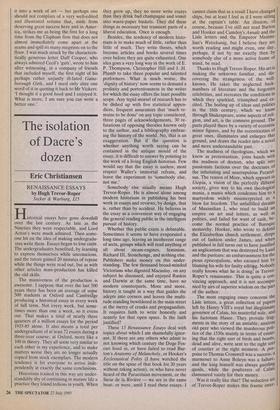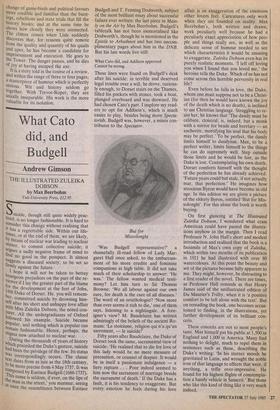The isolation of Dacre's dozen
Eric Christiansen
RENAISSANCE ESSAYS by Hugh Trevor-Roper Secker & Warburg, f15
istorical essays have gone downhill over the last century. As late as the Nineties they were respectable, and Lord Acton's were much admired. Then some- one hit on the idea of making undergradu- ates write them. Essays began to lose caste. The undergraduates benefited, by learning to express themselves while unconscious, and the tutors gained 20 minutes of repose while the things were read out, but as with other articles mass-production has killed the old skills.
The massiveness of the production is awesome. I suppose that over the last 500 years there has been an average of some 500 students at Oxford and Cambriage producing a historical essay in every week of full term. Not 'every week, but some- times more than one a week, so it evens out. That makes a total of nearly three quarters of a million essays for the period 1935-85 alone. It also means a total per undergraduate of at least 72 essays during a three-year course; at Oxford, more like a 100 in theory. They all seem very similar to each other in my experience, and to make matters worse they are no longer actually copied from stock exemplars. The modern tendency is for everyone to arrive inde- pendently at exactly the same conclusions.
Historians trained in this way are under- standably shy of continuing in mature life a practice they found tedious in youth. When
they grow up, they no more write essays than they drink bad champagne and vomit into waste-paper baskets. They did these things as necessary but transient parts of a liberal education. Once is enough.
Besides, the tendency of modern histo- rians is to make much of little, rather than little of much. They write theses, which become articles and books several times over before they are quite exhausted. One idea goes a very long way in the work of E. P. Thompson, Christopher Hill and J. H.
Plumb to take three popular and talented performers. What is much worse, the 'dignity of history' now seems to demand a prolixity and portentousness in the writer for which the essay offers the least possible scope. Any tepid morsel of research has to be dished up with five statistical appen- dices, frequent assurances that 'much re- mains to be done' on any topic considered, three pages of acknowledgements, 30 re- futations of opposing theories known only to the author, and a bibliography embrac- ing the history of the world. No, that is an exaggeration. But if the question is whether anything worth saying can be contained in the antique mould of the essay, it is difficult to answer by pointing to the work of a living English historian. Few would say that the essay is useless; most respect Waller's immortal refrain, and leave the experiment to 'somebody else, not me.'
Somebody else usually means Hugh Trevor-Roper. He is almost alone among modern historians in publishing his best work in essays and reviews; by design, that is, rather than by accident. He believes in the essay as a convenient way of engaging the general reading public in the intelligent pursuit of history.
Whether this public exists is debatable. Sometimes it seems to have evaporated a long time ago, leaving an incoherent range of sects, groups which will read anything at all about steam-engines, feminism, Richard III, Stonehenge, and nothing else.
Publishers make money on this under- standing. The few thousand broad-minded Victorians who digested Macaulay, on any subject he discussed, and enjoyed Ruskin and Darwin at the same time, have no modern counterparts. More and more, history is taught in a way that guides the adepts into corners and leaves the multi- tude standing bewildered in the main street at the mercy of cranks and propagandists. It requires faith to write honestly and acutely for that open space. Is the faith justified?
These 13 Renaissance Essays deal with topics about which I am shamefully ignor-
ant. If there are any others who admit to not knowing which century the Doge Fos- can i lived in, or have failed to read Bur-
ton's Anatomy of Melancholy, or Hooker's Ecclesiastical Polity (I have watched the title on the spine of that book for 30 years without taking action), or who have never heard of the Paracelsian movement, or the Sieur de la Riviere — we are in the same boat; or were, until I read these essays. I cannot claim that as a result I have changed ships, but at least I feel as if I were sitting at the captain's table. An illusion, of course, because I've still not read Burton and Hooker and Camden's Annals and the Lisle letters and the Emperor Maximi- lian's Weisskunig, but I believe they are worth reading and might even, one day, perhaps, if not by me exactly then by somebody else of a more active frame of mind, be read. Thanks to Hugh Trever-Roper. His art is making the unknown familiar, and dis- covering the strangeness of the well- known. He takes the neglected back numbers of literature and the forgotten celebrities, and recreates the conditions in which they sparkled, triumphed and ex- cited. The boiling up of ideas and politics in the 16th century, which we know through Shakespeare, some aspects of reli- gion, and art, is the common ground. The parts played there by a variety of eccentric minor figures, and by the eccentricities of great ones, illuminates and enlarges that ground, and draws the reader into a novel and more understandable past.
The madness of theologians, which we know as protestantism, joins hands
with the madness of doctors, who split into passionate factions over the doctrines of the infuriating and unscrupulous Paracel- sus. The reason of More, which appears in Utopia, a vision of the perfectly illiberal society, gives way to his own theological mania, a mania which condemns him to a martyrdom widely misinterpreted as a blow for freedom. The unfulfilled dreams of Maximilian I, who tried to build an empire on art and letters, as well as politics, and failed for want of cash, be- come the normal practice of Baroque monarchy. Hooker, who wrote to defend the Elizabethan church settlement, drops out of fashion under James, and when published in full turns out to have justified an anglicanism that was destroyed by Laud and the puritans: an embarrassment for the pious episcopalians, who excused him hY blaming his wife for faulty editiig. Nobody really knows what he is doing; in Trevor Roper's renaissance. This is quite a con- vincing approach, and it is not accompa- nied by airs of superior wisdom on the part of the author.
The most engaging essay concerns the Lisle letters, a great collection of papers left by Henry VIII's royal but illegitimate governor of Calais, his masterful wife, and his factotum Husee. They provide frag- ments in the story of an amiable, anxious old peer who viewed the murderous poli- tics of the 1530s mainly in terms of ensur- ing that the right sort of birds and beasts, dead and alive, were sent to the right sort of courtier at the right moment. A por- poise to Thomas Cromwell was a success, a marmoset to Anne Boleyn was a failure, and the king himself was always guzzling quails, while the poulterers of Calais clamoured vainly for their money.
Was it really like that? The seductive art of Trevor-Roper makes this frantic inter- change of game-birds and political favours more credible and familiar than the burn- ings, rebellions and state trials that fill the history books; and at the same time he Shows how closely they were connected. The climax comes when Lisle suddenly discovers that, for reasons quite remote from the quality and quantity of his quails and apes, he has become a candidate for imprisonment and execution. He goes to the Tower. The danger passes, and he dies of joy at having escaped the axe. It is a story told in the course of a review, and within the range of three or four pages; a masterpiece of humour which is perfectly serious. Wit and history seldom go together. With Trevor-Roper, they are usually inseparable. His work is the more valuable for its isolation.















































 Previous page
Previous page